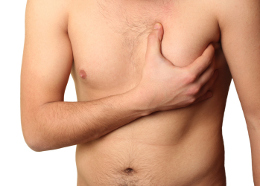A burning sensation causes an alarming concern as we doubt that it could be a symptom of any underlying heart problem. Read this article to gather more information about its causes and treatment.

There are so many vital organs (heart, lungs, esophagus) present in the chest region. Apart from these internal organs, there are muscles and other soft tissues. Any major or minor problem in one or more of these structural components can lead to a burning sensation. Its intensity often vary from mild to severe which largely depends on the underlying causes. Sometimes, it happens that the symptom is mild but as the patient is panicked, it seems to be more severe than it actually is.
Causes
Various health conditions can be held responsible for the burning chest sensation. For easier identification, each of them has been discussed here with their accompanying symptoms:
Digestion Related Problems: The trigger behind this discomfort is digestive disorders. Those who experience it at night quite frequently could be suffering from heartburn. It is not any disease but a condition where the stomach acids are pushed back into the esophagus. Initially, heartburn is felt in the upper part of the abdomen and later on, it gets radiated upwards to the chest and neck. It happens due to overeating, excessive intake of spicy foods or lying down soon after a heavy meal. However, pain after eating meals is also a possible symptom of gallbladder dysfunction where the pain tends to get aggravated if one eats fatty food. If it is observed that burning becomes intense in empty stomach and subsides after eating, then it is usually associated with stomach ulcers.
Heart Related Problems: Angina is a heart problem that arises due to inadequate supply of blood and oxygen to the heart. Here, the burning feeling originates at the left side of the breast bone and moves on to the left arm, shoulder and jaw. Similar symptoms are observed during a heart attack and can be identified with severe pain in the chest which is accompanied by a tightness and squeezing in the chest wall. Burning sensation is an identifiable symptom of aortic dissection where a tear develops in the inner wall of the aorta, the largest artery in the body, which originates from the heart.
Respiration Related Problems: Lung infection such as pneumonia, formation of blood clots inside the lungs known as pulmonary embolism and inflammation in the lining of the lungs caused by pleurisy are the major lung problems due to which burning sensation is felt. This symptom worsens with deep breathing and coughing. During asthma attacks, many patients complain about this discomfort.
Other Causes: Costochondritis gives a stinging sensation in the chest wall. It results from soreness in the cartilage that joins the ribs with the chest bone. Here, the pain is not confined to any one side of the chest and is felt on both sides. It can also be triggered by any injury or infection that affects the muscles, bones, tendons, nerves present in the chest area.
Treatment
The treatment is absolutely based upon its underlying cause. People with symptoms should be rushed to the emergency room for treatment. In the emergency room, aspirin is first administered to reduce clotting of blood and restore normal blood flow. It is followed by administration of other blood thinning medicines. Angina symptoms are often relieved with nitroglycerin and pain relieving medicines that can bring down chest pain. Along with them, beta blockers to relax the heart muscle and cholesterol lowering medicines are also used for treating the cardiac problem. For serious heart patients, doctors may recommend surgery. Minor digestive disorders can be controlled with the help of some changes in the diet and lifestyle. It includes avoiding spicy, fatty food, eating small but frequent meals and regular exercising. In serious cases of acid reflux disease, medicines like antacids, H2 blockers and proton pump inhibitors are given. Most respiration problems are successfully treated with oral medicines and inhalers. Antibiotics are prescribed for the treatment of infections.
You can see that all the causes are treatable. Therefore, next time when you experience it, sit down in a comfortable position and breathe slowly. Keep yourself relaxed and do not get panicked unnecessarily. However, you should not ignore it either and seek medical help to ascertain the cause.


 There are so many vital organs (heart, lungs, esophagus) present in the chest region. Apart from these internal organs, there are muscles and other soft tissues. Any major or minor problem in one or more of these structural components can lead to a burning sensation. Its intensity often vary from mild to severe which largely depends on the underlying causes. Sometimes, it happens that the symptom is mild but as the patient is panicked, it seems to be more severe than it actually is.
There are so many vital organs (heart, lungs, esophagus) present in the chest region. Apart from these internal organs, there are muscles and other soft tissues. Any major or minor problem in one or more of these structural components can lead to a burning sensation. Its intensity often vary from mild to severe which largely depends on the underlying causes. Sometimes, it happens that the symptom is mild but as the patient is panicked, it seems to be more severe than it actually is.